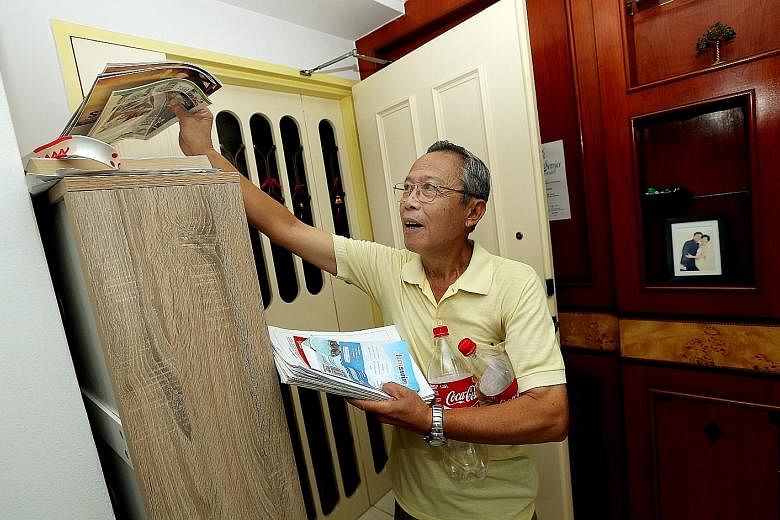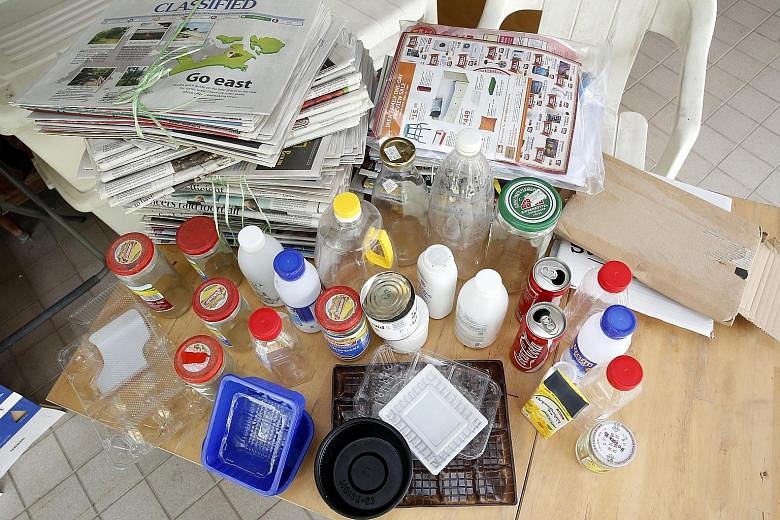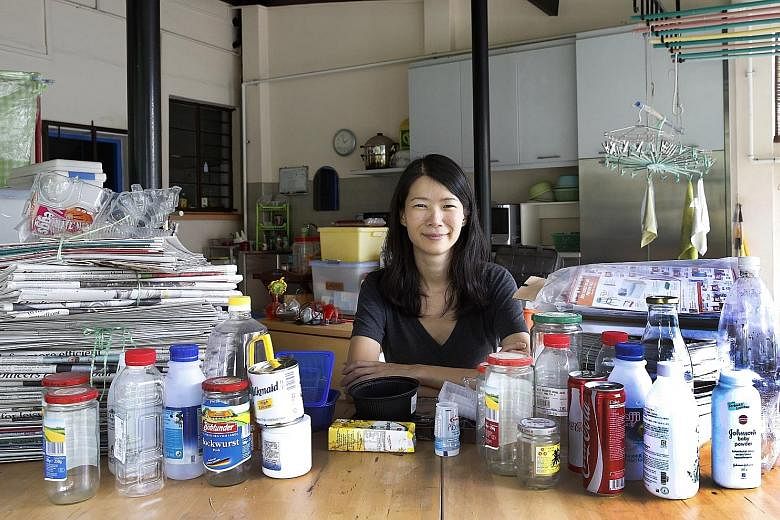Milk cartons were the first thing freelance writer Olivia Choong learnt to recycle.
She was 19 then, studying at Santa Maria College in Perth. In its boarding school, she had to recycle milk cartons by washing used ones, flattening them and taking them to the recycling bin.
That initial experience in Australia left a strong impression on her that there can be a second life for used items.
Now a passionate recycler, she has set up recycling points all over the MacPherson terrace house she shares with her family.
There is one near the kitchen where they "process" glass, plastic containers and aluminium cans, and decide which ones to wash and recycle and which ones to re-use.
In the living room, there are areas for used newspapers and magazines. She gives them to the karung guni man because she is afraid they might get contaminated in the recycling truck. Contaminated paper cannot be recycled.
Upstairs, outside the bathroom, there is a holding area for toilet rolls as well as shampoo and other plastic bottles.
Ms Choong, 38, says throwing reusable resources away is simply "irresponsible".
"This also disregards the efforts that have been spent to put the resources together in the first place."
She returned to Singapore in 2004 and worked as an associate at a public relations consultancy for three years.
Inspired by her time in Australia, in 2007, she founded the Singapore chapter of Green Drinks movement. This is a self-organising network which runs informal meet-up sessions for people who are interested in the environment.
Besides recycling, she also reduces and re-uses, the two other Rs of going green.
Getting her parents, both in their 70s, to recycle was more challenging. She has a brother, aged 42, who lives nearby with his wife.
Her mother took to recycling paper quite easily, but she found it troublesome if she had to clean things such as oily plastic containers, which she had to wash a few times; or condensed milk cans, which she had to soak first before cleaning. She preferred to throw them away.
"I used to get angry when she did not recycle these things," Ms Choong says. "Then I decided to use affirmative language and would thank her and tell her 'good job' every time she recycles."
She is still trying to get her father fully on board.
"Right now, if he is in the mood, he would recycle paper and some plastics. Otherwise, he will just throw them and I would have to fish them out of the rubbish bin."
To people who find that recycling takes too much effort, she says it is everyone's responsibility to recycle to delay the need to create new landfills. Future generations also will not have to struggle with a lack of natural resources.
While Ms Choong recycles on principle, retiree Peter Lo, 72, started because of economy.
He grew up in a rural area in Hong Kong and, as the eldest of nine children, was responsible for helping his mother with the cooking and housework.
"As resources were limited, I was taught from young not to waste things. For instance, after washing rice and vegetables, I would use the water to wash dishes and use that water again to water plants."
The habit stuck and, to this day, he still uses water this way.
Recycling things makes perfect economic sense to him. "If we don't recycle, the money spent to manage the extra waste would eventually be paid by us, the taxpayers."
He moved to Singapore in 1989 and is married to a Hong Kong-born Singaporean, aged 71. They live with their younger daughter, aged 40, in a four-room Housing Board flat in Sembawang. They have an older daughter, aged 45, who is married.
He has taught his daughters to recycle since they were young. "They know they have to put used drink bottles below the sink in the kitchen and newspaper on top of the cabinet near the door."
When the National Environment Agency first introduced blue recycling bins in his area in 2007, he knew immediately what they were for. Some of his neighbours, however, thought they were waste bins and would throw food inside. As a result, the bins became very smelly and attracted insects.
Then the vice-chairman of the Canberra Zone 2 Residents' Committee, Mr Lo asked for help from a group of volunteers he was leading to educate residents about tackling dengue, dog poo and littering in the neighbourhood.
The group started sharing information with people about what to throw into the recycling bin.
He also started a recycling drive in seven zones in the neighbourhood, which has continued to this day.
During the drive, which takes place once every two to three months at a void deck in one of the designated zones, residents are encouraged to bring their recyclables in exchange for token gifts.
They will also get to learn more about recycling and other environmental issues from volunteers, exhibition booths and games.
Of his efforts, he says: "I just want to live in a clean, green and hygienic environment."



